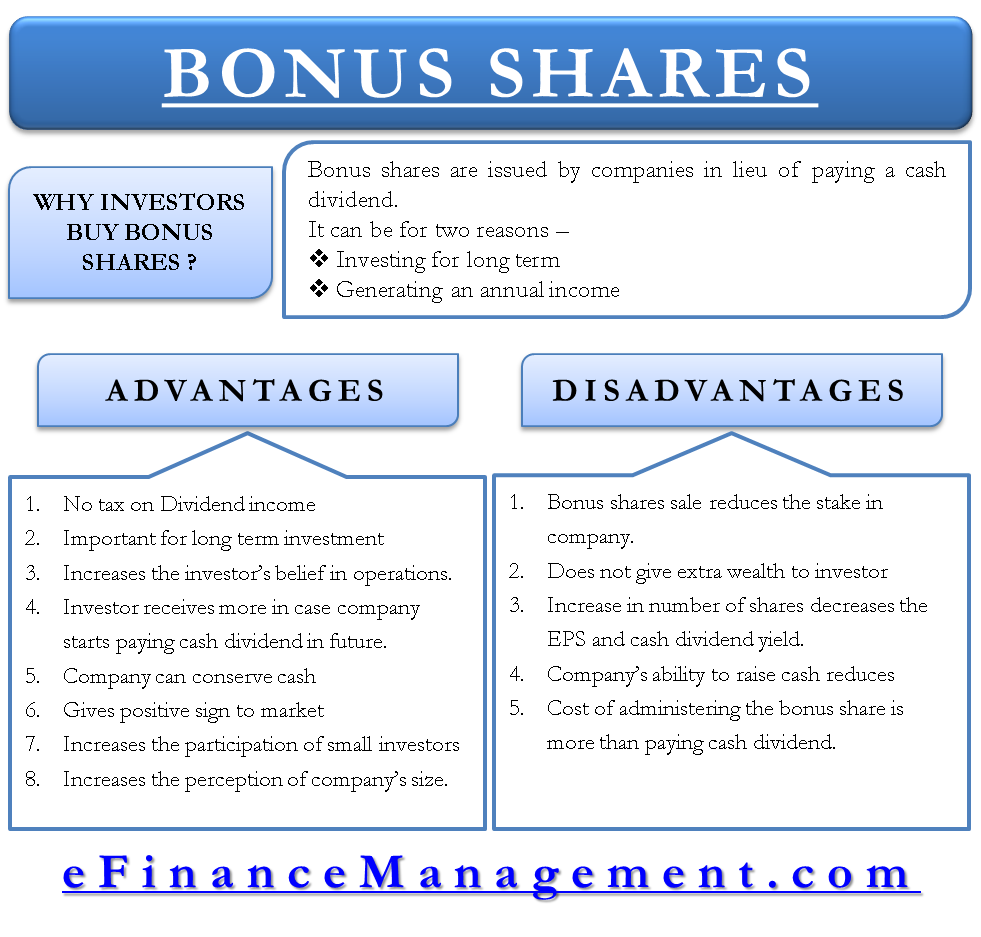Bonus shares are issued by companies instead of paying a cash dividend. As with any form of wealth transfer, these also have their own advantages and disadvantages. There are two parties involved, the issuing company and the shareholder or investor, and we will discuss the advantages and disadvantages of bonus shares from the point of view of both.
Investor’s Point of View:
Why does an investor buy equity shares of a company? It can be for two reasons –
1) investing for the long term, and
2) generating an annual income by means of dividends.
The first goal is fulfilled when the company is managed properly and adds economic value. The second goal depends on the payout policies of the company. A growth-stage company may refrain from paying any cash dividends and reinvesting everything back into the business. At the same time, a mature company may have to pay a regular annual cash dividend. But both types of companies can pay a stock dividend through a bonus issue.
Advantages of Bonus Shares from Investor’s Point of View
- The investor doesn’t need to pay any tax upon receiving the bonus shares.
- It is specifically beneficial for investors who believe in the company’s long-term story and want to increase their investment in the same.
- Issuing additional shares and using cash for the company’s business growth increases the investor’s belief in the company’s operations.
- If the company starts paying the cash dividend in the future, the investor receives more because he holds a number of shares in the company due to the past policy of paying a stock dividend.
Disadvantages of Bonus Shares from
Investor’s Point of View
- Not all investors may show interest in receiving the shares as a dividend; some may want liquidity to fulfill other objectives. When such investors sell their bonus shares for generating liquidity, their stake in the company reduces.
- The stock dividend doesn’t give any extra wealth to the shareholders because the share price drops by a proportionate amount to keep the company’s market capital the same as before.
Company’s Point of View
Over the course of a company’s lifetime, the capital needs of the company keep on changing. In the initial growth phase, preserving cash is of utmost importance, while satisfying the return desires of its shareholders takes precedence when the company is mature. A company has various means at its disposal to satisfy its objectives. And one of these is the type of dividend pay-out. A company can either choose or is forced to (because of cash constraints) pay cash or stock-based dividend. Each carries its own advantages and disadvantages, which are discussed below.

Advantages of Bonus Shares from the Company’s Point of View
- Bonus issue allows the company to conserve cash for reinvesting back into the business.
- It has a signaling effect and gives a positive sign to the market that the company believes in its long-term growth story.
- Sometimes, the company may not be able to pay any cash, so a bonus issue is the only means to satisfy the shareholders’ desire for a dividend.
- Increasing the number of outstanding shares through a bonus issue increases the participation of smaller investors in the company’s shares and hence enhances the stock’s liquidity.
- The increase in the issued share capital increases the perception of the company’s size.
Disadvantages of Bonus Shares from Company’s Point of View
- Bonus issue increases the number of outstanding shares of the company, decreasing the future EPS and cash dividend yield. This can have a negative impact on the market’s perceived value of the company.
- The company doesn’t receive any cash upon issuing bonus shares. So, the company’s ability to raise money by follow-on offerings reduces.
- The cost of administering a Bonus Share Plan is more than that of paying a cash dividend. This cost can add up over the years if the company keeps on issuing bonus shares.
Quiz on Advantages and Disadvantages of Bonus Shares
Let’s take a quick test on the topic you have read here.


Awesome notes on this website ,I really enjoyed reading it🌞